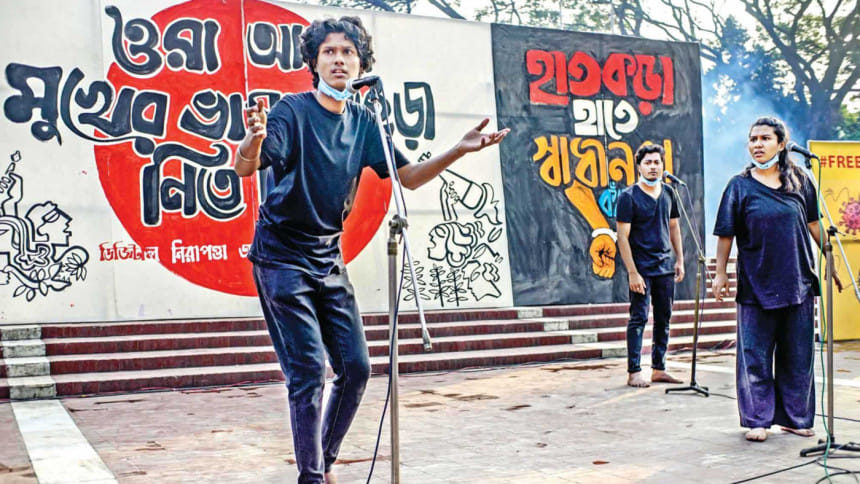When the state wants to make criminals out of journalists

Anyone who has seen the video of Chattogram-based journalist Golam Sarwar—taken shortly after he was found unconscious on the banks of a canal following a disappearance of three days—is unlikely to forget the helplessness and fear coursing through his bruised being, as he kept on uttering the words, "Please, brother, I won't write anymore." Stripped off his clothes, his bare body showing clear signs of torture, a traumatised Sarwar thought he was still being held hostage by his abductors as he pleaded for their mercy. He was picked up on his way from work, four days after he published an article alleging that a minister's family had been involved in land grabbing. Since his "reappearance," Sarwar has recounted the horror of those three "missing" days of his life, when he was held near a railway track and beaten profusely every time a train passed by. Sometimes the beatings were so severe, he thought it might be the end. He heard one of his abductors ask on the phone, "Should I finish him off?" The voice on the other side retorted, "No, keep him alive, so we can teach the other journos a lesson."
Sarwar might have thought the worst was over, but as the story goes, it was only the beginning. There have been multiple threats to his life over the course of the year, and two false cases were filed against him, soon after his recovery, by "influential quarters" for his reports, one of which accused him of causing damages worth Tk 100 crore. On the other hand, the case he filed with the police following his abduction has predictably seen no progress. I say predictably because the police had made no efforts to rescue him back when he was missing, even though his family was contacted at least five times by the abductor(s), using his own mobile phone. We know the police have the surveillance capacity to track phones (from the efficiency with which they track down dissidents and protesters), so what possible explanation could there have been for their ostensible failure to do so in his case?
A "conversation" of Sarwar with five to six policemen, including the officer-in-charge, assistant sub-inspector and sub-inspector of Chattogram Kotwali police station might offer us a clue. During a recent interview with The Daily Star, Sarwar recounted how he was interrogated for four and a half hours by the policemen, who essentially tried to dissuade him from pursuing the case further. "Why are you getting yourself in trouble by fighting this case?" "How will you fight the powerful [quarters]?" "Your background is clean, why do this to yourself?" they told him repeatedly. Are we to deduce from this "brotherly concern" that they knew who was behind his abduction—and that it was their way of alluding that ensuring justice in the case was beyond their pay-grade?
Their dedication to the investigation can be gauged from the fact that they applied for remand for the two arrested suspects a week after they had already been granted bail. The result was that the police submitted its final report in May, in which they stated that they had found no evidence of abduction. Following an appeal of no-confidence in the report, a Chattogram court rejected the findings and asked the Chattogram Police Bureau of Investigation to re-investigate the case. But given the reach of the vested, powerful quarter that Sarwar has angered, is there any hope at all that justice will be served? Not if we are to believe the Kotwali police—or every other "well-wisher" in Chattogram who has told Sarwar to back off and save himself and his family, before it's too late.
The pursuit of justice sounds noble as a rallying cry, but we all know that at the end of the day, our law enforcers are more adept at making criminals out of journalists than finding the criminals who harass, abduct or murder them. We've been (unwilling) witnesses to how the state left no stone unturned to portray photojournalist Shafiqul Islam Kajol as a high-profile criminal—dragging him through the court with his hands cuffed behind his back, and denying him bail 13 times over seven straight months in three cases filed against him under the Digital Security Act (DSA). Yet, one and a half years have passed since he was found at the Benapole border after his enforced disappearance for 53 days, and there hasn't even been a pretence of a follow-up by law enforcers about why and how Kajol went missing, and what, if anything, it had to do with the DSA case filed just a day before his disappearance by a ruling party lawmaker and party activist. Despite repeated calls for investigation, both from national and international quarters, the inaction of the law enforcers speaks volumes.
Meanwhile, without even a shred of repentance, the government has dismissed the untimely death of writer and entrepreneur Mushtaq Ahmed—who was arrested under the DSA and denied bail six times—in custody as a "natural" occurrence. But what is natural about being picked up by Rab for social media posts criticising the government's handling of Covid-19 (not much different to those shared by many of us) and rotting in jail for nine months, without so much as a chance to see his family? What is natural about a 53-year-old, with no previous history of serious illness, to be dealt the "death penalty" for exercising his constitutional right of freedom of expression, without so much as a trial?
Mushtaq's comrade, cartoonist Ahmed Kabir Kishore, who was also arrested in the same DSA case, insists that both of them were tortured in police custody. Subsequent probes conducted by the jail authorities, the Gazipur district authorities, and the home ministry did not find any negligence on the part of the authorities. But even if we pay no heed to Kishore's allegation of torture, the state cannot evade responsibility for the unfairness and arbitrariness of Mushtaq's arrest, denial of bail and eventual custodial death. If nothing else, Mushtaq may simply have died from the heartbreak of his beloved country turning into an autocratic state, and in the process turning him into a criminal.
A recent analysis of 668 DSA cases filed over three years by the think tank Centre of Governance Studies shows that 142 journalists were sued during this period, the second highest profession to be targeted after politicians. Interestingly, however, the percentage of journalists arrested (13 percent) were higher than that of politicians (11.3 percent). In many cases, investigation reports are not filed within the stipulated period, and with many of the more used sections of the DSA being non-bailable, the accused are effectively punished in custody even before trial—with Mushtaq paying the ultimate price. Even a cursory glance through the reports of journalists arrested confirm that a majority were picked up for shedding light on corruption, irregularities or state-sanctioned violations.
Much has been said by those who care about the terrifying repercussions of the Digital Security Act—at any rate, as much as can be said without themselves being picked up and tried under it. Everything we feared would happen with the enactment of the DSA—and worse—has already come true. At this point, it feels like I am stuck in a loop, much like in a Kafka novel, writing some variation of the same editorial or op-ed, over and over, demanding justice, asking for authorities to be held responsible, wishing for the DSA to be repealed, and so on. Meanwhile, things just go from bad to worse, with impunity for crimes against journalists—and the public at large—gnawing away at what remains of this elusive thing called the rule of law in this country.
Every so often, I put away the laptop and decry the end of my writing career. What is even the point of writing if we can't write what we want? But then I remember, threatening or tiring us into submission—isn't that what they really want?
Sushmita S Preetha is Impact Editor, The Daily Star.

 For all latest news, follow The Daily Star's Google News channel.
For all latest news, follow The Daily Star's Google News channel. 



Comments